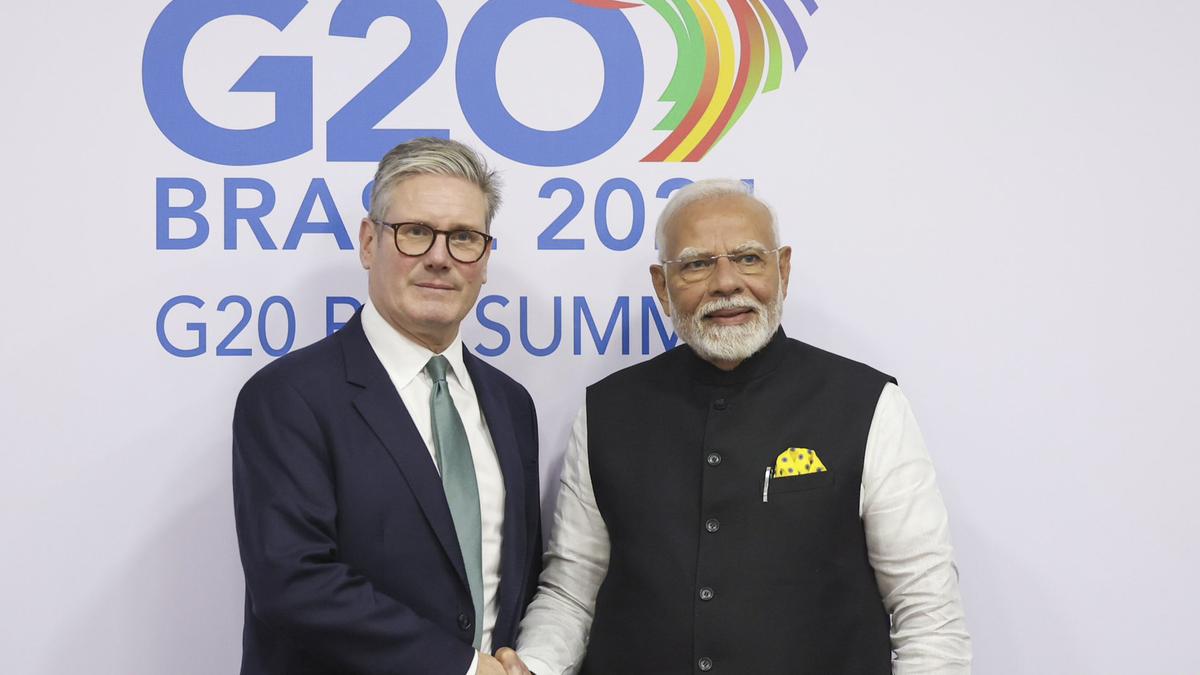India and the United Kingdom have concluded a historic Free Trade Agreement (FTA) that will see 99% of Indian exports to the U.K. benefiting from zero duties, Prime Minister Narendra Modi and U.K. Prime Minister Keir Starmer announced on Tuesday (May 6, 2025).
“In a historic milestone, India and the U.K. have successfully concluded an ambitious and mutually beneficial Free Trade Agreement, along with a Double Contribution Convention,” Mr. Modi posted on X, following a telephone conversation with Mr. Starmer.
EXPLAINED | India’s proposed free trade agreement with the U.K.
According to a release by the Commerce and Industry Ministry, the FTA ensures comprehensive market access in the U.K. for Indian goods, covering all of India’s export interests.

“India will gain from tariff elimination on about 99% of the tariff lines covering almost 100% of the trade value offering huge opportunities for increase in the bilateral trade between India and the U.K.,” the release added.
The Indian government expects the deal to double the bilateral trade between the two countries — currently at about $60 billion — by 2030.
The FTA is expected to open up export opportunities for sectors such as textiles, marine products, leather, footwear, sports goods and toys, gems and jewellery, as well as other more industrial sectors such as engineering goods, auto parts and engines, and organic chemicals.
Also Read | India committed to Free Trade Agreement with the U.K., says Modi
From India’s side, it has agreed to slash tariffs on 90% of tariff lines from the U.K., according to a statement by the U.K. government, with 85% of these set to become zero tariff within a decade.

Further, whisky and gin tariffs are to be halved from the current 150% to 75% before reducing to 40% by year ten of the deal. Automotive tariffs will go from over 100% to 10% under a quota.
“Other goods with reduced tariffs, which can open markets and make trade cheaper for businesses and Indian consumers, include cosmetics, aerospace, lamb, medical devices, salmon, electrical machinery, soft drinks, chocolate and biscuits,” the U.K. statement added.
“Today Britain has agreed a landmark trade deal with India,” Mr. Starmer announced on X.
“Fantastic news for British business, British workers, and British shoppers…,” he said.
The U.K.’s Business and Trade Secretary, Jonathan Reynolds, called the new agreement “the largest ever trade deal secured by the U.K.”.
What’s the status of India’s Free Trade Agreements?
In a relief for Indian workers temporarily in the U.K., the Double Contribution Convention signed between the two countries includes a provision wherein such Indian workers and their employers will be exempt from paying social security contributions in the U.K. for a period of three years.
The India-U.K. FTA comes after a few starts and stops. While talks officially began in January 2022, they picked up steam when the Prime Ministers of the two countries met on the sidelines of the G-20 Summit in Rio de Janeiro, Brazil, in November 2024.
However, after a brief pause, negotiations resumed in February 2025.
“This Agreement sets a new benchmark for equitable and ambitious trade between two large economies,” Commerce and Industry Minister Piyush Goyal said following the announcement. “It will benefit Indian farmers, fishermen, workers, MSMEs, start-ups and innovators.”
(With inputs from Sriram Lakshman from London)
Highlights of the India-U.K. free trade agreement
99% Indian exports to benefit from zero duty in U.K. market.
Indian import duty will be slashed, locking in reductions on 90% of tariff lines, 85% of these becoming fully tariff-free within a decade.
India reducing tariff for: whisky, medical devices, advanced machinery, and lamb, making U.K. exports more competitive
Goods with reduced import duties for Indian consumers: cosmetics, aerospace, lamb, medical devices, salmon, electrical machinery, soft drinks, chocolate and biscuits
Products with cheaper prices for British shoppers: clothes, footwear, and food products including frozen prawns
Automotive tariffs will go from over 100% to 10% under a quota
Three-year exemption from social security payments for Indian employees working in the U.K.
Export opportunities for labour-intensive sectors such as textiles, marine products, leather, footwear, sports goods and toys, gems and jewellery, engineering goods, auto parts and engines, and organic chemicals
Published – May 06, 2025 07:03 pm IST



